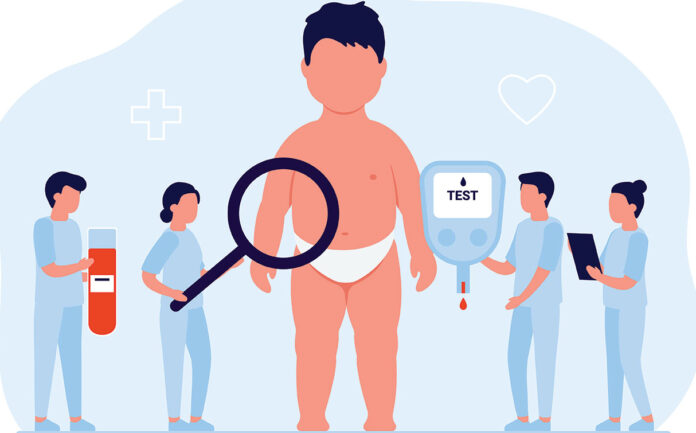
Childhood obesity more than doubles the risk of later developing multiple sclerosis (MS), new research shows. The study will be presented at this year’s European Congress on Obesity in Venice, Italy (May 12–15) presented by Claude Marcus and Emilia Hagman, the Karolinska Institute, and colleagues.
Pediatric obesity is associated with several autoimmune diseases and the leading hypothesis is that a persistent low-grade inflammatory state, typically observed in obesity, is the cause of this association. “Understanding these pathways is crucial for developing targeted prevention and intervention strategies to normalize the risk for MS in children and adolescents with obesity,” these authors say.
Emerging evidence implies a link between high body mass index (BMI) in adolescence and an increased risk of MS.
This team looked at obese patients aged 2–19 years enrolled in the Swedish Childhood Obesity Treatment Register (BORIS) between 1995–2020, and a matched comparison group from the general population. Matching criteria included sex, year of birth, and residential area. Exclusion criteria were secondary obesity (eg brain tumors such as craniopharyngioma), and genetic syndromes (eg Prader Willi, morbus Down), and MS diagnosis before 15 years of age (that is, already developing in childhood).
MS was identified through Sweden’s National Patient Register. Individuals were followed from obesity treatment initiation until MS diagnosis, death, emigration, or August 2023, whichever came first. The authors used statistical modeling to calculate any potential association.
The data included 21,661 patients (54% boys) from the pediatric obesity cohort with a median age of obesity treatment initiation (behavior and lifestyle modification) of 11.4 years. The median follow-up time was 5.6 years, corresponding to median age of 20.8 years in the follow-up population.
During follow-up, 0.13% [n=28, 18 (64%) female, 10 (36%) male] developed MS in the obesity cohort, whereas the corresponding number in the general population was 0.06% [n=58, 38 (66%) female, 20 (34%) male]. The mean age of MS diagnosis was comparable between the groups; 23.4 years in the obesity cohort versus 22.8 years in the general population comparators.
The crude incidence rate of MS per 100,000 person years was 19.3 in the obesity cohort and 8.3 in the general population cohort. Analyses adjusted for presence of parental MS (heredity) revealed that the risk of developing MS was more 2.3 times higher than in the pediatric obesity cohort, with both these findings statistically significant.
The authors said, “Despite limited follow-up time, our findings highlight that obesity in childhood is associated with an increased susceptibility of early-onset MS more than two-fold. Given that pediatric obesity is prevalent, it is likely to serve as a critical etiological contributor to the escalating prevalence of MS.”
They added, “There are several studies showing that MS has increased over several decades and obesity is believed to be one major driver for this increase. Thanks to our prospective study design, we can confirm this theory.”
Further they said, “Even though the risk for MS is more than double among children and adolescents with obesity, the absolute risk for MS remains lower than for many other comorbidities associated with obesity. Nevertheless, our study adds to the evidence that obesity in early life increases the risk for a plethora of diseases including MS, and not only the well-known cardiometabolic conditions such as heart disease and diabetes.”













